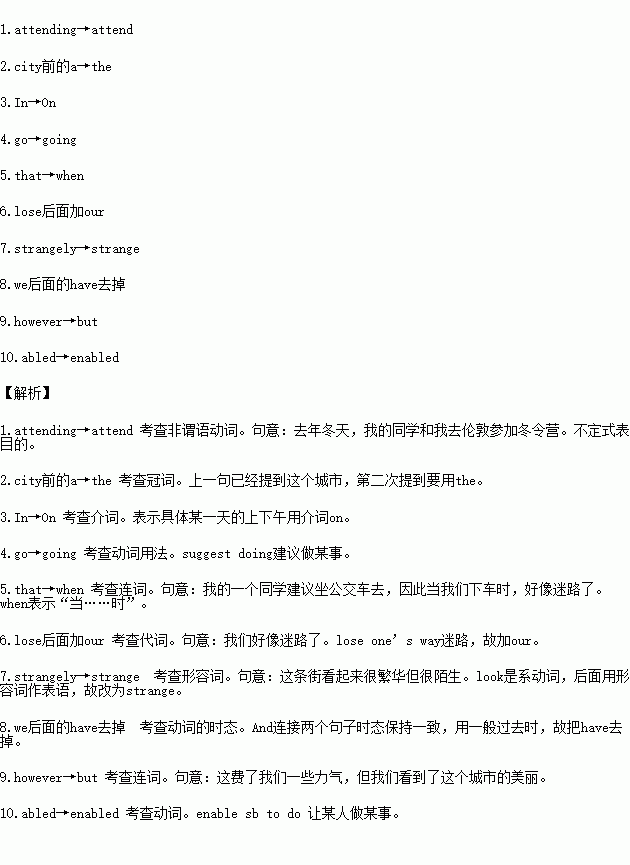ΧβΡΩΡΎ»ί
ΕΧΈΡΗΡ¥μ
ΦΌΕ®”Δ”οΩΈ…œάœ Π“Σ«σΆ§Ήά÷°ΦδΫΜΜΜ–όΗΡΉςΈΡΘ§«κΡψ–όΗΡΡψΆ§Ήά–¥ΒΡ“‘œ¬ΉςΈΡΓΘΈΡ÷–Ι≤”–10¥Π”ο―‘¥μΈσΘ§ΟΩΨδ÷–ΉνΕύ”–ΝΫ¥ΠΓΘΟΩ¥Π¥μΈσΫω…φΦΑ“ΜΗωΒΞ¥ ΒΡ‘ωΦ”ΓΔ…Ψ≥ΐΜρ–όΗΡΓΘ
‘ωΦ”ΘΚ‘Ύ»±¥ ¥ΠΦ”“ΜΗω¬©Ή÷ΖϊΚ≈Θ®ΓΡΘ©Θ§≤Δ‘ΎΤδœ¬Οφ–¥≥ωΗΟΦ”ΒΡ¥ ΓΘ
…Ψ≥ΐΘΚΑ―Εύ”ύΒΡ¥ ”Ο–±œΏΘ®®vΘ©Μ°ΒτΓΘ
–όΗΡΘΚ‘Ύ¥μΒΡ¥ œ¬Μ°“ΜΚαœΏΘ§≤Δ‘ΎΗΟ¥ œ¬Οφ–¥≥ω–όΗΡΚσΒΡ¥
ΉΔ“βΘΚ1Θ°ΟΩ¥Π¥μΈσΦΑΤδ–όΗΡΨυΫωœό“Μ¥ ΘΜ
2Θ°÷Μ‘ –μ–όΗΡ10¥ΠΘ§Εύ’ΏΘ®¥”ΒΎ11¥ΠΤπΘ©≤ΜΦΤΖ÷ΓΘ
Last winter, my classmates and I went to London to attending a winter camp. To better understand the history and culture of a city, we scheduled a ΓΑmuseum tripΓ±. In Saturday morning we got up early and studied the map carefully to work out the route. One of my classmates suggested go there by bus to enjoy the street view. It was a long ride, so that we got off the double-decker bus, we seemed to lose way. The streets looked busy and strangely, and we have had to ask a passer-by for help. She pointed out the right direction and wished us a good day. Thanks to the friendly woman, we finally got to our destination. It took us some effort, however we witnessed the real beauty of the city. The experience also abled us to practise our English. What a terrific experience!
The Healthy Habits Survey shows that only about one third of American seniors have correct habits. Here are some findings and expert advice.
1. How many times did you brush your teeth yesterday? Γώ Finding: A full 33% of seniors brush their teeth only once a day. Γώ Step: Remove the 300 types of bacteria in your mouth each morning with a battery-operated toothbrush. Brush gently for 2 minutes at least twice a day. 2. How many times did you wash your hands or bathe yesterday? Γώ Finding: Seniors, on average, bathe fewer than 3 days a week. And nearly 30% wash their hands only 4 times a day---half of the number doctors recommend. Γώ Step: We touch our faces around 3,000 times a day-often inviting germsΘ®≤ΓΨζΘ©to enter our mouth, nose, and eyes. Use toilet paper to avoid touching the door handle. And, most important, wash your hands often with hot running water and soap for 20 seconds. 3. How often do you think about fighting germs(≤ΓΨζ)? Γώ Finding: Seniors are not fighting germs as well as they should. Γώ Step: Be aware of germs. Do you know it is not your toilet but your kitchen sponge (ΚΘΟύ) that can carry more germs than anything else? To kill these germs, keep your sponge in the microwave for 10 seconds. |
1. What is found out about American seniors?
A. Most of then have good habits.
B. Nearly 30% of them bathe three days a week.
C. All of them are fighting germs better than expected.
D. About one third of them brush their teeth only once a day.
2. Doctors suggest that people should wash their hands ________.
A. twice a day B. three times a day
C. four times a day D. eight times a day
3. Which of the following is true according to the text?
A. We should keep from touching our faces.
B. There are less than 300 types of bacteria in the mouth.
C. A kitchen sponge can carry more germs than a toilet.
D. We should wash our hands before touching a door handle.
4.The text probably comes from ________.
A. a guide book B. a popular magazine
C. a book review D. an official document

